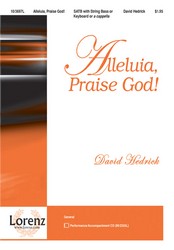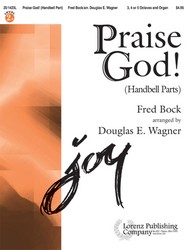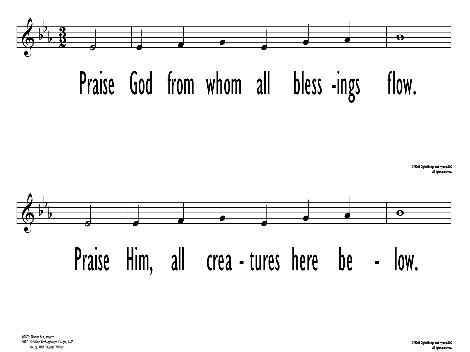- |
User Links
Praise God From Whom All Blessings Flow

Praise God, from whom all blessings flow (Ken)
Author: Thomas Ken (1674)Tune: OLD HUNDREDTH
Published in 1293 hymnals
Printable scores: PDFPlayable presentation: Lyrics only, lyrics + musicAudio files: MIDI, Recording
Representative Text
Praise God, from whom all blessings flow;
Praise Him, all creatures here below;
Praise Him above, ye heav'nly host;
Praise Father, Son, and Holy Ghost.
Amen.
Baptist Hymnal, 1991
Author: Thomas Ken
 Thomas Ken (b. Berkampstead, Hertfordshire, England, 1637; d. Longleat, Wiltshire, England, 1711) studied at Winchester College, Hart Hall, and New College, Oxford, England. Ordained in the Church of England in 1662, he served variously as pastor, chaplain at Winchester College (1669-1679), chaplain to Princess (later Queen) Mary in The Hague, and bishop of Bath and Wells (1685-1691). He was a man of conscience and independent mind who did not shirk from confrontations with royalty. When King Charles II came to visit Winchester, he took along his mistress, the famous actress Nell Gwynne. Ken was asked to provide lodging for her. The story is told that Ken quickly declared his house under repair and had a builder take off the roof! He later… Go to person page >
Thomas Ken (b. Berkampstead, Hertfordshire, England, 1637; d. Longleat, Wiltshire, England, 1711) studied at Winchester College, Hart Hall, and New College, Oxford, England. Ordained in the Church of England in 1662, he served variously as pastor, chaplain at Winchester College (1669-1679), chaplain to Princess (later Queen) Mary in The Hague, and bishop of Bath and Wells (1685-1691). He was a man of conscience and independent mind who did not shirk from confrontations with royalty. When King Charles II came to visit Winchester, he took along his mistress, the famous actress Nell Gwynne. Ken was asked to provide lodging for her. The story is told that Ken quickly declared his house under repair and had a builder take off the roof! He later… Go to person page >Text Information
Related Texts
| First Line: | Praise God, from whom all blessings flow (Ken) |
| Title: | Praise God From Whom All Blessings Flow |
| Author: | Thomas Ken (1674) |
| Meter: | 8.8.8.8 |
| Place of Origin: | England |
| Language: | English |
| Notes: | French translation: "Gloire à Dieu, notre Cráteur"; German translations: See "Preist Gott der allen segen gibt", "Preist Gott, der alles Segens voll"; Hawaiian translation: See "Ho'onani i ka Makua mau"> by Hiram Bingham; Polish translation: See: "Niech Boga wielbi każdy twór" in Śpielnik metodystyczny, 1986;Spanish translation: See "A Dios el Padre celestial" by Anonymous, "Cantad al trino y uno Dios"; Tahitian translation: "Arue i te Atua"; |
| Copyright: | Public Domain |
Adapt. Book of Wors
Cherokee
Chinese
Dutch
English
- A Choice Collection of Hymns, and Spiritual Songs, designed for the devotions of Israel, in prayer, conference, and camp-meetings...(2nd ed.) #148
- A Collection of Hymns and Sacred Songs: suited to both private and public devotions, and especially adapted to the wants and uses of the brethren of the Old German Baptist Church #349
- A Collection of Hymns for Public, Social, and Domestic Worship #1054
- A Collection of Hymns for the use of the African Methodist Episcopal Zion Church in America #1130
- A Collection of Hymns for the Use of the Methodist Episcopal Church: principally from the collection of Rev. John Wesley, M. A., late fellow of Lincoln College, Oxford; with... (Rev. & corr.) #606
- A Collection of Hymns for the Use of the Methodist Episcopal Church: Principally from the Collection of the Rev. John Wesley. M. A. #606
- A Collection of Hymns, for the Christian Church and Home #A2
- A Collection of Hymns, for the use of the United Brethren in Christ: taken from the most approved authors, and adapted to public and private worship #1070
- A Collection of Hymns: for the use of the Methodist Episcopal Church, principally from the collection of the Rev. John Wesley, A. M., late fellow of Lincoln College..(Rev. and corr. with a supplement) #606
- A Collection of Hymns: Supplementary to the Psalms and Hymns of Dr. Watts #D1 10 shown out of 999
French
German
- Evangelisches Kirchengesangbuch: Ausgabe für die Landeskirchen Rheinland, Westfalen und Lippe #487
- Lift Up Your Hearts: psalms, hymns, and spiritual songs #965
- Santo, Santo, Santo: cantos para el pueblo de Dios = Holy, Holy, Holy: songs for the people of God #696
- The Selah Song Book (Das Sela Gesangbuch) (2nd ed) #71a
Hausa
Hawaiian
Japanese
Korean
Latin
Lingala
Mandarin
Mohawk
Navajo
Portugese
Portuguese
Spanish
Tahitian
Welsh
Yupik
Tune
OLD HUNDREDTHThis tune is likely the work of the composer named here, but has also been attributed to others as shown in the instances list below. According to the Handbook to the Baptist Hymnal (1992), Old 100th first appeared in the Genevan Psalter, and "the first half of the tune contains phrases which may ha…
For Leaders
This short text calls upon all of creation, on earth and in heaven, to offer praise to the Trinity, in recognition that all good things come from God.
Text:
In about 1674, Bishop Thomas Ken wrote three hymns for morning, evening, and midnight as an addition to his A Manual of Prayers for the Use of the Scholars of Winchester College. These hymns were published by Ken in a pamphlet in 1694, and were included in the Manual in its 1695 edition. “Praise God, From Whom All Blessings Flow” was the text of the final, doxological stanza for all three of them. It is now well-known on its own as a doxology, or as a concluding stanza for other hymns, such as “All Creatures of Our God and King,” or “All People That on Earth Do Dwell.”
Tune:
OLD HUNDREDTH is by far the most common tune to which this text is sung. It is sometimes called SAVOY, or GENEVAN 134 after its original text in the Genevan Psalter. This psalm tune is often attributed to Louis Bourgeois, who edited the Genevan Psalter of 1551, in which it first appeared. The tune became associated with William Kethe's version of Psalm 100 in the Anglo-Genevan Psalter of 1560, from which the name OLD HUNDREDTH is derived.
There are two versions of the tune with respect to rhythm. Usually, when the tune is used with “All People That on Earth Do Dwell,” the original rhythm is maintained. However, many congregations are more familiar with the altered, isorhythmic version, because that is often the version sung with this doxology.
When/Why/How:
This song is often sung at the beginning of worship or at the presentation of the offering. In some churches, it is sung every Sunday. To avoid monotony, try a longer setting of the Doxology text to original music such as the choral arrangement by David Hedrick titled “Alleluia, Praise God!” (sung unaccompanied or with a simple string bass line), or a tune by an anonymous nineteenth-century American composer, edited by William Rowan in “Praise God From Whom All Blessings Flow.” Because this text is a single, well-known stanza, it is often used as a bridge within a larger choral anthem. Sometimes it is set to original music, and at other times, the traditional tune is used. “Sing!” is an original composition by Cindy Berry, in which the doxology text is used as a bridge, set to an altered version of OLD HUNDREDTH. Another example of this very short text as part of a larger work is in “Thanks and Blessings Flow,” in which “Praise God, From Whom All Blessings Flow,” set to original music, is the bridge before the last verse of “Now Thank We All Our God.” Optional brass, percussion, and congregational participation are included.
Tiffany Shomsky, Hymnary.org
Timeline
Arrangements
Media
The United Methodist Hymnal #95
Worship and Rejoice #34
With Heart and Voice: songs for all God's children #157
- MIDI file from Baptist Hymnal 1991 #253
- Audio recording from Baptist Hymnal 1991 #253
- MIDI file from Baptist Hymnal 1991 #253
- MIDI file from The Cyber Hymnal #1260
- Audio recording from Evangelical Lutheran Worship #884
- Audio recording from Evangelical Lutheran Worship #885
- Audio recording from Glory to God: the Presbyterian Hymnal #606
- Audio recording from Lift Up Your Hearts: psalms, hymns, and spiritual songs #964
- Audio recording from Lift Up Your Hearts: psalms, hymns, and spiritual songs #964
- Audio recording from Lift Up Your Hearts: psalms, hymns, and spiritual songs #965
- MIDI file from New Songs of Praise and Power 1-2-3 Combined #162
- Audio recording from The Presbyterian Hymnal: hymns, psalms, and spiritual songs #593
- MIDI file from Psalter Hymnal (Gray) #637
- MIDI file from Psalter Hymnal (Gray) #638
- Audio recording from Trinity Hymnal (Rev. ed.) #732
- Audio recording from Trinity Hymnal (Rev. ed.) #733
- Audio recording from The Worshiping Church #808
- Audio recording from The Worshiping Church #809
- MIDI file from The United Methodist Hymnal #95
- Audio recording from The United Methodist Hymnal #95
- MIDI file from Worship and Rejoice #34
- MIDI file from With Heart and Voice: songs for all God's children #157
- MIDI file from With Heart and Voice: songs for all God's children #158


 My Starred Hymns
My Starred Hymns







